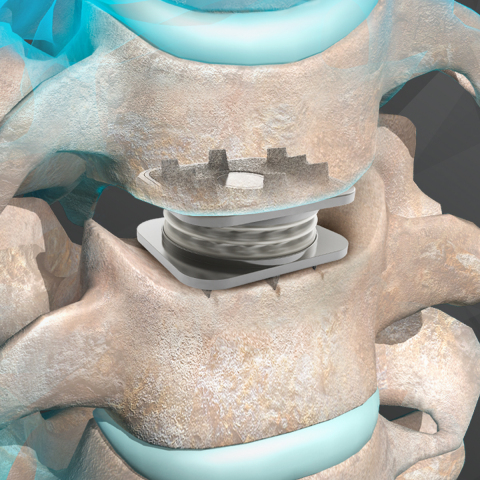Orthofix M6-C Artificial Cervical Disc IDE Study Three- and Four-Year Data to be Presented at ISASS
Orthofix Medical Inc (NASDAQ:OFIX) announced positive preliminary results from the three- and four-year follow-up of its M6-C artificial cervical disc study. The data will be presented at the ISASS annual meeting on May 14. Key findings include a mean Neck Disability Index (NDI) score of 10.9 at three years and 10.3 at four years for M6-C patients, compared to 17.2 and 19.2 for the ACDF group, respectively. The study highlights statistically significant pain score improvements in neck and shoulder/arm pain. The M6-C disc, approved by the FDA in 2019, validates the benefits of cervical disc arthroplasty.
- M6-C disc shows significant improvement in NDI scores: 10.9 at three years, 10.3 at four years versus 17.2 and 19.2 for ACDF.
- 93.6% of M6-C patients reported a 15-point improvement in NDI at three years, increasing to 95.7% at four years.
- Lower mean neck pain VAS scores: 1.1 at three years and 1.0 at four years for M6-C, compared to 2.0 and 2.3 for ACDF.
- High overall success rate of M6-C at 86.8% at 24 months, indicating efficacy against ACDF.
- None.
Insights
Analyzing...
Orthofix Medical Inc. (NASDAQ:OFIX), a global medical device company with a spine and orthopedics focus, today announced preliminary three- and four-year functional outcomes from the M6-C™ artificial cervical disc single-level IDE study. These results will be presented on Friday, May 14 during the International Society for the Advancement of Spine Surgery (ISASS) annual meeting in Miami, Florida.

Illustration of the M6-C artificial surgical disc. (Photo: Business Wire)
“Midterm study results show that patients treated with the M6-C artificial cervical disc continue to have statistically significant benefits at three and four years as measured by the Neck Disability Index (NDI) and neck, shoulder and arm pain as measured by the Visual Analog Scale (VAS) scores, as compared to anterior cervical discectomy and fusion (ACDF) patients,” said Dr. Frank Phillips, Professor of Orthopedic Surgery at Rush University Medical Center and an investigator in the study, who will present the data at the ISASS meeting. “This is important as it demonstrates the positive results originally reported in the study have been maintained through four years.”
NDI results at three and four years indicate:
- At three years, the M6-C disc patients had a mean NDI score of 10.9 − significantly better than the mean of 17.2 observed in the ACDF group.
- A significant difference was also observed at four years, with the M6-C disc group having a mean NDI score of 10.3 compared to 19.2 for the ACDF group.
- Patients receiving the M6-C disc experienced a mean improvement from the NDI baseline of 43.9 points at three years and 45.2 points at four years, compared to 35.5 and 32.8, respectively, for the ACDF cohort, with the four-year results being significantly better for the M6-C disc group.
- A greater percentage of the M6-C disc patients experienced a 15-point improvement in NDI from baseline − 93.6 percent at three years and 95.7 percent at four years − compared to the ACDF cohort reporting 86.6 percent and 82.7 percent, respectively. The four-year results were significantly better for the M6-C disc group.
- One removal was reported in the M6-C group within the first four post-operative years, compared to three in the ACDF group. Five-year data are being compiled.
Neck pain and shoulder/arm pain VAS scores indicate:
- At three years post-op, patients in the M6-C group had a mean neck pain VAS score of 1.1, which was significantly better than the mean of 2.0 observed in the ACDF control group.
- Similarly, a significant difference was observed at four years with an M6-C disc mean neck pain score of 1.0 compared to 2.3 for the ACDF group.
- Significant improvement results were also observed in shoulder/arm pain VAS Scores (worse side) at three years, with an average of 0.9 for the M6-C disc patients compared to 2.2 for the ACDF group, and at four years with an average of 0.6 for the M6-C disc patients compared to 2.7 for the ACDF group.
- Patients with the M6-C disc experienced a mean neck pain VAS score improvement from baseline of 6.1 points at three years and 6.2 points at four years, compared to 5.2 and 4.8, respectively, for the ACDF cohort, with the four-year scores being significantly better for the M6-C disc group.
- Patients with the M6-C disc experienced a mean improvement in shoulder/arm pain VAS scores of 6.3 at three years and 6.6 at four years. Both measures were significantly better than the improvements reported for the ACDF (5.4 at three years and 5.0 at four years post-op).
“It is exciting to see the three- and four-year results from the M6-C artificial cervical disc IDE clinical study continue to validate the positive outcomes of cervical disc arthroplasty,” said Orthofix President of Global Spine Kevin Kenny. “With its unique design, the M6-C disc is one of the flagship products in our comprehensive cervical line of procedural solutions. We are proud to be able to provide this motion enabling technology to surgeons and their patients.”
A prospective, non-randomized, concurrently controlled clinical trial, the M6-C IDE study was conducted at 23 sites in the U.S. with an average patient age of 44 years. The study evaluated the safety and effectiveness of the M6-C artificial cervical disc compared to ACDF for the treatment of single-level symptomatic cervical radiculopathy with or without cord compression. The overall success rate for the protocol-specified primary endpoint for the M6-C disc patients was 86.8 percent at 24 months and 79.3 percent in the control group. This data statistically demonstrated that cervical disc replacement with the M6-C disc is not inferior to treatment with ACDF. The M6-C disc received U.S. FDA approval in February 2019 based on the results of this study.
To learn more, please visit us at booth #7 at the ISASS annual meeting.
About the M6-C Artificial Cervical Disc
The M6-C artificial cervical disc is a next-generation intervertebral disc designed to restore physiologic motion to the spine and is indicated as an alternative to cervical fusion. The device is comprised of ultra-high molecular weight polyethylene fiber wrapped in a specific pattern, with multiple redundant layers that create a fiber matrix (artificial annulus). The fiber is then wound around a polycarbonate urethane polymer core creating an artificial nucleus. Like a natural disc, this unique construct allows for shock absorption at the implanted level and provides a controlled range of motion when the spine transitions in its combined complex movements. The M6-C artificial cervical disc is the only disc available in the U.S. with these features.
About Orthofix
Orthofix Medical Inc. is a global medical device and biologics company with a spine and orthopedics focus. The Company’s mission is to deliver innovative, quality-driven solutions as we partner with health care professionals to improve patient mobility. Headquartered in Lewisville, Texas, Orthofix’s spine and orthopedics products are distributed in more than 70 countries via the Company’s sales representatives and distributors. For more information, please visit www.Orthofix.com.
Forward-Looking Statements
This communication contains forward-looking statements within the meaning of Section 21E of the Securities Exchange Act of 1934, as amended, and Section 27A of the Securities Act of 1933, as amended, relating to our business and financial outlook, which are based on our current beliefs, assumptions, expectations, estimates, forecasts and projections. In some cases, you can identify forward-looking statements by terminology such as “may,” “will,” “should,” “expects,” “plans,” “anticipates,” “believes,” “estimates,” “projects,” “intends,” “predicts,” “potential,” or “continue” or other comparable terminology. These forward-looking statements are not guarantees of our future performance and involve risks, uncertainties, estimates and assumptions that are difficult to predict, including the risks described in Part I, Item 1A under the heading Risk Factors in our Annual Report on Form 10-K for the year ended December 31, 2020 (the “2020 Form 10-K”). In addition to the risks described there, factors that could cause or contribute to such differences may include, but are not limited to: the risk that FDA approvals may be delayed or not be obtained; the risk that surgeons may be slow to adopt the M6-C artificial cervical disc; the risk that future patient studies or clinical experience and data may indicate that treatment with the M6-C artificial cervical disc does not improve patient outcomes as much as previously believed, or otherwise call into question the benefits of its use to patients, hospitals and surgeons; the risk that the product may not perform as intended and may therefore not achieve commercial success; the risk that competitors may develop superior products or may have a greater market position enabling more successful commercialization; the risk that insurance payers may decline to reimburse healthcare providers for the use of our products.
This list of risks, uncertainties and other factors is not complete. We discuss some of these matters more fully, as well as certain risk factors that could affect our business, financial condition, results of operations, and prospects, in reports we file from time-to-time with the SEC, which are available to read at www.sec.gov. Any or all forward-looking statements that we make may turn out to be wrong (due to inaccurate assumptions that we make or otherwise), and our actual outcomes and results may differ materially from those expressed in these forward-looking statements. You should not place undue reliance on any of these forward-looking statements. Further, any forward-looking statement speaks only as of the date hereof, unless it is specifically otherwise stated to be made as of a different date. We undertake no obligation to update, and expressly disclaim any duty to update, our forward-looking statements, whether as a result of circumstances or events that arise after the date hereof, new information, or otherwise.
View source version on businesswire.com: https://www.businesswire.com/news/home/20210513005161/en/







